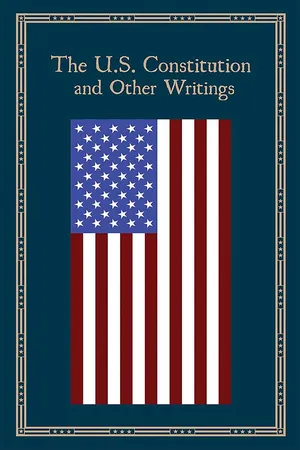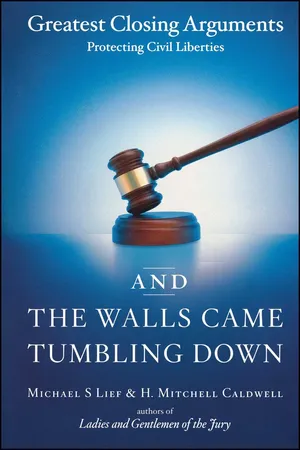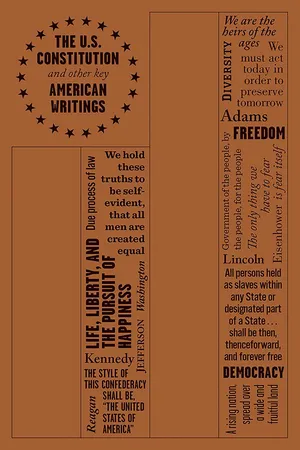Politics & International Relations
Susan B Anthony
Susan B. Anthony was a prominent American suffragist and social reformer who played a key role in the women's suffrage movement. She was a co-founder of the National Woman Suffrage Association and dedicated her life to advocating for women's right to vote. Anthony's tireless efforts and activism paved the way for the eventual passage of the 19th Amendment, granting women the right to vote in the United States.
Written by Perlego with AI-assistance
Related key terms
Related key terms
1 of 4
Related key terms
1 of 3
3 Key excerpts on "Susan B Anthony"
- eBook - ePub
- (Author)
- 2017(Publication Date)
- Canterbury Classics(Publisher)
UFFRAGE (1873 )DELIVERED IN TWENTY-NINE OF THE POST OFFICE DISTRICTS OF MONROE, AND TWENTY-ONE OF ONTARIO, IN HER CANVASS OF THOSE COUNTIES, PRIOR TO HER TRIAL IN JUNE, 1873.In 1872 activist Susan B. Anthony cast an illegal vote in the presidential election. She was arrested and put on trial the next year, where she delivered a rousing speech about the injustice of the ban on women voting. Ultimately, Anthony was found guilty and fined $100, which she refused to pay. Throughout her life, she remained an advocate for many issues, including women’s suffrage. Susan B. Anthony died in 1906 … fourteen years before the U.S. government amended the Constitution to give women the right to vote.F riends and Fellow-citizens: I stand before you tonight, under indictment for the alleged crime of having voted at the last Presidential election, without having a lawful right to vote. It shall be my work this evening to prove to you that in thus voting, I not only committed no crime, but, instead, simply exercised my citizen’s right, guaranteed to me and all United States citizens by the National Constitution, beyond the power of any State to deny.Our democratic-republican government is based on the idea of the natural right of every individual member thereof to a voice and a vote in making and executing the laws. We assert the province of government to be to secure the people in the enjoyment of their unalienable rights. We throw to the winds the old dogma that governments can give rights. Before governments were organized, no one denies that each individual possessed the right to protect his own life, liberty and property. And when 100 or 1,000,000 people enter into a free government, they do not barter away their natural rights; they simply pledge themselves to protect each other in the enjoyment of them, through prescribed judicial and legislative tribunals. They agree to abandon the methods of brute force in the adjustment of their differences, and adopt those of civilization. - eBook - ePub
And the Walls Came Tumbling Down
Greatest Closing Arguments Protecting Civil Libertie
- Michael S Lief, H. Mitchell Caldwell(Authors)
- 2006(Publication Date)
- Scribner(Publisher)
The eighteenth-century British legal commentator William Blackstone succinctly assessed the historical relationship between men and women: “Husband and wife are one, and that one is the husband.” A little more than a hundred years later, American women found themselves with fewer rights than the recently freed slaves, for a constitutional amendment not only removed the latter’s chains, but granted them access to the ballot box. The suffragettes of the post–Civil War era would wait more than fifty years to take part lawfully in the democratic process. But Susan B. Anthony refused to wait, and she took up her cause armed with only a ballot and a relentless moral standard. She voted in the election of 1872 and changed history by breaking the law and challenging it through a trial that would garner national attention.By twenty-first-century standards, what the feminist radicals of the 1800s sought was modest. But to gain any voice, generations of brave and forward-thinking people faced public ridicule and condemnation. They championed their unpopular cause of equality in the face of hundreds of years of legal and societal subjugation. Today, every American citizen over the age of eighteen can vote. Yet for the female half of the population, this right was not stated in the U.S. Constitution and was not established until well into the twentieth century. Women’s suffrage was the product of decades of struggle and unrest, and its central figure was Susan B. Anthony.Women’s rights have occupied an awkward position in American history. As a social cause, women’s suffrage was the undercard to both the abolitionist and black suffrage movement during the bulk of the nineteenth century. Suffragists and reformers for both causes were fighting oppression and inequality, and the commonality of goals often created a political synergy through the fusion of the two causes.Both schools of antebellum reformists had common characteristics of radical thought and idealism founded on philosophies such as William Lloyd Garrison’s secular visions of equality among all people. The Civil War ushered in an era of change in the American social landscape, yet strangely, after the war, the feminists found themselves deserted by many of the abolitionist champions, many of whom now focused their efforts solely on black rights and suffrage. Indeed, many civil rights leaders felt that the push for African-American suffrage would be hindered by the additional burden of the “women’s cause.” Black suffrage was an arduous struggle in its own right, and the added baggage of another controversial issue seemed destined to sink both efforts. Though some reformists remained loyal to both suffrage causes, and most probably supported women’s rights in their hearts, feminism needed new heroes. From the ashes of the post–Civil War reconstruction era, new leaders for the feminist cause needed to emerge. - Founding Fathers(Author)
- 2015(Publication Date)
- Canterbury Classics(Publisher)
SUSAN B. ANTHONY ON WOMEN’SSUFFRAGE (1873) __________In 1872, activist Susan B. Anthony cast an illegal vote in the presidential election. She was arrested and put on trial the next year, where she delivered a rousing speech about the injustice of the ban on women voting. Ultimately, Anthony was found guilty and fined $100, which she refused to pay. Throughout her life, she remained an advocate for many issues, including women’s suffrage. Susan B. Anthony died in 1906 … fourteen years before the U.S. government amended the Constitution to give women the right to vote.DELIVERED IN TWENTY-NINE OF THE POSTOFFICE DISTRICTS OF MONROE, AND TWENTY-ONE OF ONTARIO, IN HER CANVASS OF THOSECOUNTIES, PRIOR TO HER TRIAL IN JUNE, 1873.
F riends and Fellow-citizens: I stand before you tonight, under indictment for the alleged crime of having voted at the last Presidential election, without having a lawful right to vote. It shall be my work this evening to prove to you that in thus voting, I not only committed no crime, but, instead, simply exercised my citizen’s right, guaranteed to me and all United States citizens by the National Constitution, beyond the power of any State to deny.Our democratic-republican government is based on the idea of the natural right of every individual member thereof to a voice and a vote in making and executing the laws. We assert the province of government to be to secure the people in the enjoyment of their unalienable rights. We throw to the winds the old dogma that governments can give rights. Before governments were organized, no one denies that each individual possessed the right to protect his own life, liberty and property. And when 100 or 1,000,000 people enter into a free government, they do not barter away their natural rights; they simply pledge themselves to protect each other in the enjoyment of them, through prescribed judicial and legislative tribunals. They agree to abandon the methods of brute force in the adjustment of their differences, and adopt those of civilization.
Index pages curate the most relevant extracts from our library of academic textbooks. They’ve been created using an in-house natural language model (NLM), each adding context and meaning to key research topics.
Explore more topic indexes
Explore more topic indexes
1 of 6
Explore more topic indexes
1 of 4


